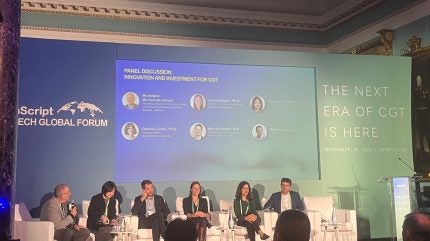

As confidence grows for innovative in vivo strategies, some investors are saying they could be the future of the cell and gene therapy (CGT) sector.
In recent months, several high-profile deals have taken place within the in vivo chimeric antigen receptor (CAR)-T space. Last month, Bristol Myers Squibb acquired Orbital Therapeutics for $1.5bn, shortly after Gilead Sciences bought Interius BioTherapeutics for $350m in September. In July, AbbVie acquired Capstan Therapeutics and its in vivo CAR-T therapy for up to $2.1bn.

Discover B2B Marketing That Performs
Combine business intelligence and editorial excellence to reach engaged professionals across 36 leading media platforms.
During a panel discussion on innovation and investment at the GenScript Biotech Global Forum London 2025 held on 20 November, Matthieu Coutet from Sofinnova Partners said pharma and investors are moving towards in vivo approaches in the CGT space. Coutet added that these days, pharma are showing very little interest in investing in autologous cell therapy companies.
Despite the enthusiasm, in vivo gene therapy is still in its infancy with limited data in humans, said Laura Stoppel, partner at RA Capital Management.
Stoppel said she is “cautiously optimistic” about allogeneic approaches in autoimmune disease, and hence RA Capital Management is investing in the space, but more data is still needed.
Speaking about autoimmune diseases she said: “I think that’s a place where allogeneic actually has the potential to match the efficacy of autologous cell therapy, especially if you don’t need long term persistence of these cells.”

US Tariffs are shifting - will you react or anticipate?
Don’t let policy changes catch you off guard. Stay proactive with real-time data and expert analysis.
By GlobalDataSafety also remains a hurdle in the CGT space, with systemic therapies prompting investor caution.
Nonetheless, experts said there is scope to expand beyond the traditional fields of oncology with CGTs. For example, ophthalmology was identified as a key area for drug development. Daniela Couto, general partner at BioGeneration Ventures, highlighted Complement Therapeutics’ investigation in dry age-related macular degeneration (AMD) and geographic atrophy (GA) as an example of an investable CGT biotech working in an area of unmet need in a “huge indication”.
“If we could do a gene therapy, one and done, we would change the way we’re treating patients with geographic atrophy,” she said. Panellists also described favourability among investors and pharma for locally administered gene therapies.
Another factor that investors are considering is the availability of alternate treatment options. With the development of cost-effective T-cell engagers, Couto said it is difficult to justify investing in cell therapies. She added that investors are largely drawn towards in situ delivery modalities, due to cost and complexity of production.
In addition, Stoppel highlighted that a biotech’s preparedness and investment in manufacturing capabilities is a key aspect of consideration when investing. She also said there is a need for more innovation to optimise manufacturing processes.
Cell & Gene Therapy coverage on Pharmaceutical Technology is supported by Cytiva.
Editorial content is independently produced and follows the highest standards of journalistic integrity. Topic sponsors are not involved in the creation of editorial content.




